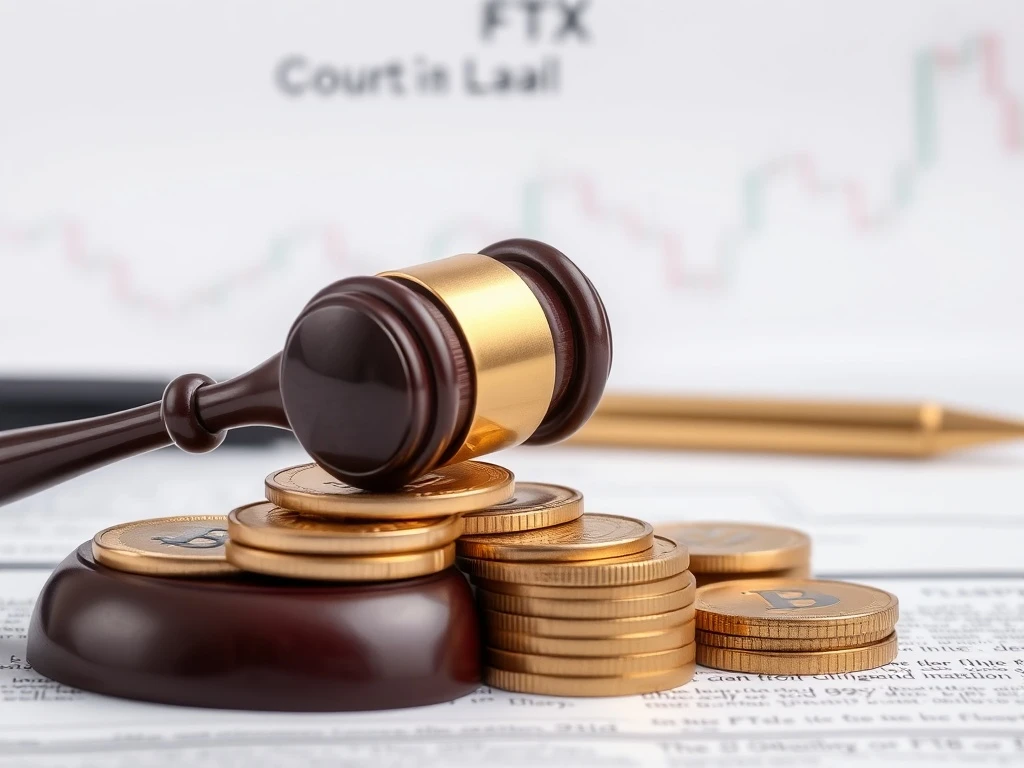FTX Fraud: Crucial Law Firm Fenwick & West Vehemently Denies Allegations

The spectacular collapse of FTX sent shockwaves through the cryptocurrency world. Now, a significant legal battle unfolds, placing a prominent law firm, Fenwick & West, directly in the spotlight. This firm, once a legal advisor to the defunct crypto exchange, now vehemently denies claims of its pivotal involvement in the alleged multibillion-dollar FTX fraud. Crypto enthusiasts and legal observers alike are closely watching this development, as it could set important precedents for professional services firms operating within the digital asset space.
Fenwick & West Confronts FTX Fraud Allegations
Fenwick & West has formally requested a federal judge to dismiss an updated class-action lawsuit. This suit alleges the firm played a central role in the infamous FTX fraud and its subsequent downfall. Earlier this month, FTX users sought to amend their initial 2023 complaint. They cited new evidence from bankruptcy and criminal proceedings. These new details, they claim, highlight Fenwick’s “key and crucial role” in how the fraud was executed.
However, Fenwick & West strongly refutes these accusations. In a recent filing to a Florida federal judge, the firm argued against the users’ request to update the suit. Fenwick characterized the plaintiffs’ theory as “as facile as it is flawed.” Furthermore, the firm asserted its innocence, stating it is “not liable for aiding and abetting a fraud it knew nothing about.” It explained that its actions were merely providing “routine and lawful legal services to their clients,” a common practice for law firms.
Examining the Basis of the Crypto Lawsuit
The new accusations against Fenwick & West stem from a sprawling multi-district class-action lawsuit. FTX users initiated this legal action following the exchange’s collapse in late 2022. This extensive legal group has also pursued claims against various celebrities and companies. These entities allegedly collaborated with FTX, including another law firm, Sullivan & Cromwell. Interestingly, the group later dropped its claims against Sullivan & Cromwell due to a lack of evidence.
Fenwick contends that the proposed updated complaint is both “untimely” and “misleading.” It argues the allegations rely on “stale information” that has been available for years. Moreover, Fenwick highlighted that these new allegations against it mirror those previously used against Sullivan & Cromwell. After a report concluded Sullivan & Cromwell had no knowledge of FTX’s fraud, the action against them was dismissed. Consequently, Fenwick questions the validity of similar claims now brought against them. “They offer no credible reason why the same allegations should survive against Fenwick,” the firm added.
Dispelling Claims from the Sam Bankman-Fried Trial
The plaintiffs also cited testimony from Nishad Singh, FTX’s lead engineer, during the Sam Bankman-Fried trial. They claimed Singh testified that Fenwick was aware of and helped conceal the “misuse of customer funds” and “improper loans.” Fenwick, however, strongly refutes this interpretation. The firm clarified Singh’s testimony, stating he merely advised on structuring founder loans. These are common instruments for closely held companies like FTX.
Furthermore, Fenwick emphasized that numerous witnesses testified during Bankman-Fried’s trial. These witnesses included FTX’s in-house counsel, other employees, executives, directors, long-time accountants, and other outside law firms. All of them stated the fraud at FTX occurred without their knowledge. “Fenwick is no different,” the firm asserted. This collective testimony paints a picture of a deeply hidden fraud, suggesting that external advisors, including Fenwick & West, were unaware of the illicit activities.
Fenwick Rejects FTT Securities Claims
A new facet of the proposed complaint involves allegations that Fenwick helped launch and promote the FTX Token (FTT). The plaintiffs claim this violated Florida and California securities laws. Fenwick dismisses these claims as “far-fetched, frivolous,” and untimely. The firm argues these allegations should have been “asserted months — if not years — earlier.”
“These new claims come far too late,” Fenwick stated in its filing. It further contended that if the plaintiffs genuinely believed they had state securities claims against Fenwick, they had ample opportunity to allege them at the outset. The firm accused the plaintiffs of adding these two new allegations strategically. This move occurred after a judge dismissed all but the state securities laws claims against celebrities who allegedly promoted FTX. “This is an an eleventh-hour attempt to evade the Court’s ruling on the Celebrity Defendants’ motion to dismiss,” Fenwick claimed. The firm believes this is an attempt “to recast lawyers as ‘promoters,’” concluding, “But this theory too goes nowhere.”
The Broader Impact on Customer Funds and Legal Precedent
The ongoing legal battles surrounding FTX highlight critical issues for the crypto industry. Specifically, they underscore the complex task of recovering customer funds and assigning liability. This particular crypto lawsuit against Fenwick & West could establish significant legal precedents. It may redefine the scope of responsibility for professional service firms advising cryptocurrency companies. As the industry matures, the scrutiny on legal and financial advisors intensifies. Ensuring proper due diligence and transparency becomes paramount.
The outcome of this case will undoubtedly influence future engagements between law firms and crypto enterprises. It could lead to stricter guidelines for legal counsel in a rapidly evolving regulatory landscape. Ultimately, the goal remains to ensure justice for those impacted by the FTX fraud. The pursuit of accountability, therefore, extends beyond the direct perpetrators. It now encompasses those who provided services, however routine, to the collapsed entity.
The legal saga surrounding FTX continues to unravel, bringing new complexities and challenges. Fenwick & West maintains its innocence, asserting it merely provided standard legal services. The plaintiffs, conversely, seek to hold the firm accountable for its alleged role in the fraud. As this high-stakes crypto lawsuit progresses, the industry watches intently. The ultimate decision will shape the legal framework for digital assets and the responsibilities of their professional partners for years to come.







